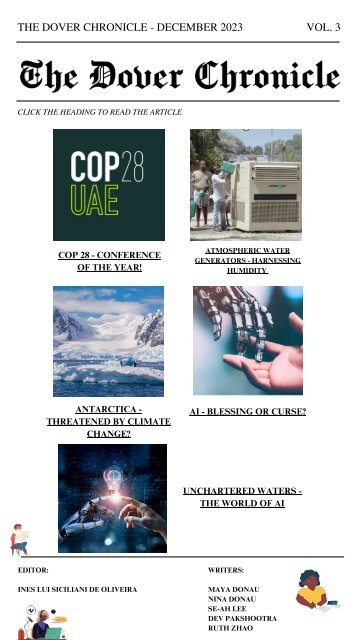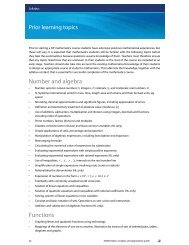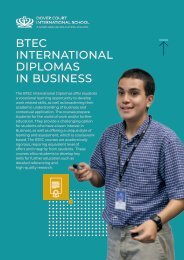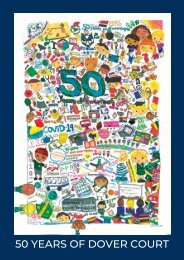THE DOVER CHRONICLE VOL 3
Create successful ePaper yourself
Turn your PDF publications into a flip-book with our unique Google optimized e-Paper software.
<strong>THE</strong> <strong>DOVER</strong> <strong>CHRONICLE</strong> - DECEMBER 2023 <strong>VOL</strong>. 3<br />
CLICK <strong>THE</strong> HEADING TO READ <strong>THE</strong> ARTICLE<br />
COP 28 - CONFERENCE<br />
OF <strong>THE</strong> YEAR!<br />
ATMOSPHERIC WATER<br />
GENERATORS - HARNESSING<br />
HUMIDITY<br />
ANTARCTICA -<br />
THREATENED BY CLIMATE<br />
CHANGE?<br />
AI - BLESSING OR CURSE?<br />
UNCHARTERED WATERS -<br />
<strong>THE</strong> WORLD OF AI<br />
EDITOR:<br />
INES LUI SICILIANI DE OLIVEIRA<br />
WRITERS:<br />
MAYA DONAU<br />
NINA DONAU<br />
SE-AH LEE<br />
DEV PAKSHOOTRA<br />
RUTH ZHAO
Ruth Zhao<br />
<strong>THE</strong> <strong>DOVER</strong> <strong>CHRONICLE</strong> - DECEMBER 2023 <strong>VOL</strong>. 3<br />
COP 28 - CONFERENCE OF <strong>THE</strong> YEAR!<br />
Excitingly, COP (Conference of the<br />
parties) 28 is coming up – already! It had<br />
only been in Berlin, 1995, that the first<br />
COP took place, and here we are, 28 years<br />
later for COP 28. A spectacular feat,<br />
indeed. Over the years, it has gained<br />
international recognition and now many<br />
people attend annually, amongst them<br />
famous people like Greta Thunberg, for<br />
example.<br />
Today, in our exciting interview on COP<br />
28, we will be hearing from<br />
environmentalist Liming Qiao.<br />
Liming Qiao is an environmentalist who<br />
has been working in the environmental<br />
sector since 2003, gaining 20 years of<br />
experience, and has been present since<br />
COP 9. She has worked with WWF and is<br />
currently the head of Asia for the Global<br />
Wind Energy Council (GWEC).<br />
We are very interested in hearing her<br />
thoughts and feelings on the much awaited<br />
COP 28. Without further ado, here we go!<br />
R: Hello, Ms. Qiao. How are you today?<br />
L: Good thank you!<br />
R: That’s good to hear! Now, as you<br />
know, we’re here today to talk about COP<br />
28. So, my first question is, can you please<br />
explain the term COP to our readers?<br />
L: It stands for Conference of the parties to<br />
the United Nations Framework Convention<br />
of Climate Change (UNFCCC) and it's an<br />
annual conference. Apart from this annual<br />
conference, throughout the year there are<br />
also multiple intersessions, for example,<br />
there is usually a conference in the middle<br />
of the year around June to continue the<br />
matters that have been discussed in the<br />
annual conference.<br />
So, what they do at COP is to meet as<br />
government delegations to negotiate the<br />
different protocols, and/or other forms of<br />
legally binding treaties/agreements to<br />
implement or achieve the goal of the<br />
UNFCCC, which is to protect the climate,<br />
through mitigation (to go to the cause of<br />
climate change and find ways to reduce<br />
greenhouse gas emissions, for example by<br />
replacing coal fire power plants with<br />
renewable energy sources) and adaptation<br />
(to acknowledge that climate change is<br />
happening and that we need to find a way<br />
to help humans adapt to the resulting<br />
changes in the ecosystem).
Ruth Zhao<br />
<strong>THE</strong> <strong>DOVER</strong> <strong>CHRONICLE</strong> - DECEMBER 2023 <strong>VOL</strong>. 3<br />
R: That’s great... thank you for the lovely<br />
explanations! So, my second question is:<br />
how have you seen the COPs develop over<br />
the years? Do you think there have been<br />
lots of improvements; if so how and to<br />
what extent?<br />
L: All the UN negotiation processes are<br />
open to observers, so there are lots of<br />
NGOs and academia who register as<br />
observers and have been doing so for<br />
many, many years. From the year 2007 &<br />
2008 climate change has gained lots of<br />
spotlight and international attention. And<br />
increasingly, in the past 10 years to become<br />
recognised as a global issue. Thus, the<br />
COP negotiation has attracted more people,<br />
which I think is a huge success.<br />
Apart from the government delegation<br />
doing the formal negotiations and groups<br />
of NGOs who follow the negotiation<br />
process very closely, there are other groups<br />
(NGOs) outside the negotiations, outside<br />
the formal negotiations and talks, who uses<br />
the space and attention to set up<br />
workshops, seminars and high-level<br />
meetings with government members. There<br />
are many exhibition spaces as well, which I<br />
think in the end makes the whole COP a<br />
colourful display.<br />
R: So then what are you hoping for in the<br />
future of climate change?<br />
Well, good question. I think my hope 10<br />
years ago was that the consensus of climate<br />
change at a global level would be higher<br />
and that the energy transition could really<br />
be driven by that. And what I’m glad to see<br />
now is that it is becoming a reality. And<br />
lots of Heads of States are making bold<br />
commitments at COP/around COP and<br />
more countries in Asia are becoming<br />
committed to Net Zero. I also would love<br />
to see more action at a national level to<br />
push for a higher share of renewable<br />
energy.<br />
R: Thank you so much, Ms. Qiao, for this<br />
in-depth interview in which you have lent<br />
your expertise so brilliantly to us. I hope<br />
to see you around again!<br />
Overall, we are all hoping for a successful<br />
COP this year, where new discussions will<br />
take place and that this will be another year<br />
in a step towards a cleaner, more renewable<br />
future for us all.<br />
One significant change through the years is<br />
that more than 10 years ago, we had the<br />
Kyoto protocol. The Kyoto protocol are<br />
protocols that were set onto countries, both<br />
developed and developing countries who<br />
participated, which were rules that the<br />
countries complied to. There were heavier<br />
rules for the developed countries, as they<br />
were often the ones that emitted the most<br />
greenhouse gases, whereas there were<br />
looser rules for developing countries<br />
(compared to developed countries).<br />
However, we then had the Paris Agreement<br />
in 2015 where countries made their own<br />
goals and strives to achieve them.<br />
Since Kyoto protocol, it has improved<br />
‘flexible’ mechanisms such as the carbon<br />
market, which became one of the<br />
fundamental market designs that has been<br />
there for many years and will continue to<br />
have a role in the future. Thus, the creation<br />
of the carbon market led to business<br />
opportunities, which brings in a number of<br />
new players into climate related businesses.
Nina Donau<br />
<strong>THE</strong> <strong>DOVER</strong> <strong>CHRONICLE</strong> - DECEMBER 2023 <strong>VOL</strong>. 3<br />
ATMOSPHERIC WATER GENERATORS -<br />
HARNESSING HUMIDITY<br />
2 billion people worldwide lack the access<br />
to safe drinking water. In a world where<br />
access to clean and safe drinking water is<br />
becoming an increasingly pressing issue,<br />
innovative solutions such as Atmospheric<br />
Water Generators have recently emerged,<br />
acting as a potential remedy. Atmospheric<br />
Water Generators (AWGs) extract moisture<br />
from the air in order to produce clean and<br />
potable drinking water.<br />
Imagine. You are standing in a lush green<br />
field on a warm summer day. You feel a<br />
gentle breeze brush against your skin,<br />
carrying with it invisible drops of moisture.<br />
As you inhale, you can taste the freshness<br />
of the air. Amid nature stands a machine.<br />
This machine acts as a guard, welcoming<br />
air into its filtering system. It meticulously<br />
removes impurities such as dust and dirt to<br />
ensure that only pure air can pass through.<br />
As the air enters the heat exchanger, it<br />
passes over a cold surface and condenses<br />
into liquid water. Filtration systems then<br />
purify and mineralise this water. This water<br />
is then stored in a built-in reservoir and<br />
continuously circulated through a UV<br />
lamp, enabling it to be kept fresh and clean.<br />
High-quality water is then available for<br />
drinking.<br />
As atmospheric water generators do not<br />
rely on bodies of water, they can be placed<br />
in remote locations, which can be<br />
beneficial in rural areas without<br />
infrastructure to supply water. This can<br />
alleviate water scarcity which can<br />
contribute to Sustainable Development<br />
Goal 6 ‘Clean Water and Sanitation’.<br />
Additionally, they can also be<br />
advantageous in the case of emergency<br />
situations such as natural disasters in which<br />
there are water shortages. Atmospheric<br />
water generators offer a sustainable<br />
alternative to traditional water sources as<br />
they reduce the reliance on freshwater<br />
reserves, which reduces the need for<br />
extensive transport networks. In addition to<br />
lowering costs, this also reduces carbon<br />
dioxide emissions. Furthermore, some<br />
atmospheric water generators operate<br />
utilising renewable energy sources such as<br />
solar power which further ameliorates<br />
issues of greenhouse gas emissions.<br />
Despite showing great promise,<br />
Atmospheric Water Generators have their<br />
limitations. Atmospheric water generators<br />
require a significant amount of energy to<br />
extract water from the atmosphere.<br />
Moreover, they rely on specific<br />
environmental conditions, such as humidity<br />
levels to effectively operate which may not<br />
always be present. There is a high initial<br />
cost to purchase and install an atmospheric<br />
water generator, making it more difficult to<br />
implement in countries with limited<br />
amounts of finance. In addition, AWGs<br />
require constant maintenance and regular<br />
filter replacement, which further increases<br />
costs.<br />
While presenting both opportunities and<br />
challenges, Atmospheric Water Generators<br />
offer a potential solution to combatting<br />
water scarcity and by embracing this<br />
revolutionary technology, we can create a<br />
more sustainable future for the planet and<br />
ourselves.<br />
Arguing that we must be for or against<br />
cultivated meat is just setting up a false<br />
dichotomy: in reality, we must strike while<br />
the iron is hot and utilise this food<br />
technology to revolutionise global food<br />
production whilst managing the challenges.
SeAh Lee<br />
<strong>THE</strong> <strong>DOVER</strong> <strong>CHRONICLE</strong> - DECEMBER 2023 <strong>VOL</strong>. 3<br />
ANTARCTICA - THREATENED BY<br />
CLIMATE CHANGE?<br />
Antarctica, located at the most southern part of<br />
the Earth, is sized at over 13,660,000, and is<br />
home to many different species of animals.<br />
Penguins, Antarctic hair grass, Antarctic<br />
pearlworts and more of other species that can<br />
only be found in Antarctica.<br />
The minimum temperature going down to -90<br />
degrees Celsius during winter season and<br />
average temperature -57 degrees Celsius each<br />
year, Antarctica is the coldest area on the<br />
Earth. On the warmer periods, temperature<br />
goes up to only -2 and 8 degrees Celsius. Cold<br />
wind blows through Antarctica. Katabatic is<br />
strong wind of Antarctica that is formed by a<br />
dense and cold air from polar plateau.<br />
Around summer solstice, sun doesn’t rise or<br />
set in Antarctica. It can be all night and day<br />
long condition of sun rising or setting.<br />
Sometimes, the sun is visible for 24 hours a<br />
day.<br />
Evidence in change due to climate in<br />
Antarctica:<br />
There is a lot of evidence of climate change in<br />
Antarctica. The main source of evidence that<br />
people think about is the melting of ice, but<br />
there is other evidence such as decreasing<br />
population of penguins, ice cores of carbon<br />
dioxide and scientific and geographical<br />
changes in Antarctica.<br />
The population of penguins is decreasing.<br />
This is proven due to melting of ice. As ice<br />
starts to melt, penguins don’t have anywhere<br />
to breed or lay eggs. If they do, they are<br />
most likely to fall into the ocean or ice<br />
would slowly melt, threatening the penguins.<br />
Young-born penguins that are kept in some<br />
areas of ice also drown because there is no<br />
ice left to stay on and because of their lack<br />
of developed feathers to swim.<br />
Many people are not aware of penguin’s<br />
population decreasing very dramatically. But<br />
it is very important to the ecosystem that it<br />
breaks down the food chains and food webs.<br />
Many of the animals and plants in Antarctica<br />
are extinctic. “65% of Antarctica's Plants<br />
and Wildlife Will Decline by 2100”. This is<br />
because they don’t have the environment and<br />
habitats to live in. This is caused by rising<br />
temperatures due to climate change.<br />
According to the investigations of the<br />
scientists, it is proven that people are using<br />
more carbon dioxide compared to other<br />
years. There had been more carbon dioxide<br />
found in the ice cores compared to 1900s.<br />
Scientists are highlighting the fact that if<br />
people keep on using same amount of carbon<br />
dioxide, Earth temperature might rise about<br />
2 degrees.
SeAh Lee<br />
<strong>THE</strong> <strong>DOVER</strong> <strong>CHRONICLE</strong> - DECEMBER 2023 <strong>VOL</strong>. 3<br />
Why should we protect Antarctica:<br />
Antarctica supplies safe shelter and a home<br />
for all the animals and plants to live in. If it<br />
were gone, it would mean that all these<br />
organisms would die or lose their<br />
habitat/home. This would cause extinction<br />
to that species. How would it affect us<br />
humans? All the animals are connected to<br />
each other in some ways. We all depend on<br />
each other, if the whole ecosystem crashes<br />
down, it would be a threat to the entire<br />
world. Including humans.<br />
And finally, it is linked to all of Earth. If<br />
Antarctica is gone, Earth wouldn’t be able<br />
to reflect off most of the light and climate<br />
change would continue, getting worse and<br />
worse. Also, flooding and island<br />
disappearance would be frequent.<br />
Therefore, it is our duty, our job to protect<br />
and save Antarctica from climate change.<br />
Antarctica also provides many scientific<br />
experiments and new discoveries to many<br />
things. If it is destroyed or melted, it would<br />
mean that humans wouldn’t be able to<br />
continue their scientific experiments on<br />
future planets and discoveries. They would<br />
lose their chance to improve their life and<br />
technology.
Maya Donau<br />
<strong>THE</strong> <strong>DOVER</strong> <strong>CHRONICLE</strong> - DECEMBER 2023 <strong>VOL</strong>. 3<br />
AI - BLESSING OR CURSE?<br />
What is AI? Artificial intelligence is<br />
defined as the simulation of human<br />
intelligence in machines that are<br />
programmed to think and act like humans.<br />
The prevalence of Artificial intelligence in<br />
our everyday, constantly developing world<br />
is growing exponentially and is being used<br />
in schools and there are great drawbacks<br />
and advantages to this technology.<br />
In a school setting, Artificial intelligence<br />
has a myriad of uses for educators and<br />
students alike. This technology is most<br />
harnessed by students, in the context of<br />
solving a math problem, summarizing<br />
notes, helping with homework, correcting<br />
spelling and grammar, or simply doing the<br />
work assigned to a student. When does this<br />
go too far?<br />
AI is not an entirely negative thing; in fact,<br />
it is extremely positive when used correctly<br />
and can indefinitely aid the academic<br />
ascension of a student. As academics we<br />
must learn to use Artificial Intelligence to<br />
our advantage as we will undoubtedly have<br />
some involvement with it in the future.<br />
However, the problems start to arise when<br />
academic integrity comes into question.<br />
Along with the aforementioned benefits<br />
that AI grants there are also disadvantages<br />
that are reciprocal to this technology.<br />
Firstly, one can request for an Artificial<br />
intelligence software to just complete all a<br />
students work, which may relax them and a<br />
create a stress-free environment, however<br />
this is just not the case because in the<br />
future, education may become futile and<br />
undervalued as everyone has the perception<br />
that AI does the trick.<br />
Students will face the impacts of this.<br />
Additionally, the Information that AI<br />
grants is not always reliable or factual<br />
which only creates misinformation. If<br />
students use this in their work, the use of<br />
AI can result in plagiarism. Overall, many<br />
call the usage of this dystopian and are<br />
against the increasing dependency on<br />
Artificial intelligence<br />
To repel the problems faced by AI and the<br />
popularization of Artificial intelligence<br />
software's such as ChatGPT, schools have<br />
implemented the increasing use of<br />
plagiarism and AI detectors. In schools and<br />
universities alike, the use of AI chatbots is<br />
being banned.However this does not<br />
inherently stop a student from using this<br />
technology.<br />
The problem of the legitimacy and<br />
effectiveness of these anti-AI softwares<br />
such as Turnitin could be questioned<br />
because many students have been falsely<br />
accused of AI usage whilst their work was<br />
completely done by themselves. Detection<br />
tools have recognized the Declaration of<br />
Independence and the works of William<br />
Shakespeare to be generated by Artificial<br />
intelligence when this is completely not the<br />
case, showing that students can also be<br />
wrongly alleged to be using such tools.<br />
To conclude, the significance of Artificial<br />
intelligence in a school environment cannot<br />
be overestimated because it is an<br />
increasingly common thing within schools<br />
everywhere. A.I is a powerful tool that has<br />
the capacity to help us, but if it is misused<br />
it can cause one's academic downfall.
Dev Pakshootra<br />
<strong>THE</strong> <strong>DOVER</strong> <strong>CHRONICLE</strong> - DECEMBER 2023 <strong>VOL</strong>. 3<br />
UNCHARTERED WATERS - <strong>THE</strong> WORLD OF AI<br />
With the recent controversies surrounding<br />
CEO Sam Altman and the OpenAI Board<br />
of directors, talks of AI’s many issues and<br />
ethical debates have been pushed into the<br />
forefront of global discourse Inevitably,<br />
one must acknowledge that AI is already,<br />
and will continue to be a dominant<br />
emerging force in shaping the<br />
technological future of the world.<br />
Ultimately, the responsibility falls upon us<br />
whether AI stands as a force for good or<br />
for bad. In this article, I will endeavour to<br />
explore some of the complex issues and<br />
debates that have arisen from this recent<br />
saga.<br />
In case you haven’t already heard about the<br />
whole story, let’s get you up to speed. On<br />
Friday the 17th of November, Sam Altman<br />
was unexpectedly ousted as the OpenAI<br />
CEO, through a consensus vote by the<br />
board of directors. This took the entire<br />
internet by storm, as Sam had been the face<br />
of the company’s rapid growth and success<br />
throughout the past year. According to a<br />
statement released by OpenAI, they<br />
“concluded that he was not consistently<br />
candid with his communications.” This<br />
caused quite a stir in the tech community,<br />
as the company seemed to be alluding to<br />
some form of dishonesty or malfeasance<br />
from Altman. Many conspiracy theories<br />
were thrown up to explain the situation,<br />
including rumours of a power struggle, a<br />
secret project that had been concealed by<br />
Altman, and more along the same<br />
speculative lines.<br />
Sam then engaged in talks with Microsoft<br />
CEO Satya Nadella, about starting<br />
Microsoft’s own AI branch that could<br />
potentially rival OpenAI themselves.<br />
Altman was reinstated as OpenAI CEO less<br />
than a week after his initial ousting, owing<br />
to over 95% of their employees signing a<br />
document that threatened to leave the<br />
company if Altman was not reinstated. On<br />
the contrary, the OpenAI Board featured a<br />
substantial overhaul, with many fresh faces<br />
replacing the old ones that voted to remove<br />
Altman.<br />
This chaotic story between the tech giants<br />
of America has given way to heated<br />
discussions on the topic of AI. One of the<br />
major storylines that popped up was the<br />
dangers of over commercializing AI<br />
products, as Altman aimed to do. Many<br />
members of the public fear that the rapid<br />
development of AI with profitable purpose<br />
is the wrong approach, preferring to<br />
continue research that evaluates the ethical<br />
and economic impacts that these modern<br />
technologies could have. Elon Musk<br />
himself has warned of the many dangers<br />
that it poses to modern civilisation, calling<br />
for a “regulatory structure” to be put in<br />
place.<br />
Before delving into the subject however,<br />
we must clear up some common<br />
misconceptions about Artificial<br />
Intelligence. Artificial intelligence refers to<br />
machines attempting to mimic a human<br />
cognitive process to solve a problem.<br />
Widely integrated in our lives today, AI<br />
models like ChatGPT, DALL-E, or Bard<br />
exemplify this. The term machine learning<br />
is sometimes used interchangeably with<br />
AI; however, Machine Learning is a<br />
smaller subset of artificial intelligence<br />
wherein machines study data and attempt<br />
to recognise patterns, thereby improving<br />
over time at a classification or prediction<br />
task by being trained on more data. Deep<br />
Learning is a further subset of machine<br />
learning, referring to predictive models that<br />
are based around the philosophies of the<br />
human brain (neural networks).<br />
Another popular debate that has stemmed<br />
from this drama is the implications of AGI<br />
(Artificial General Intelligence). AGI<br />
refers to computer models that gain, for<br />
lack of a better word, a degree of sentience.<br />
Models that can think like humans do, with<br />
their own values, subjective judgement and<br />
opinions, experiences, and even emotions.<br />
Although we are still a way off from these<br />
types of machines, with our current rapid<br />
development pace these may be a reality<br />
sooner rather than later. One of the leading<br />
concerns for these machines is aligning<br />
them with human values and objectives.
Dev Pakshootra<br />
<strong>THE</strong> <strong>DOVER</strong> <strong>CHRONICLE</strong> - DECEMBER 2023 <strong>VOL</strong>. 3<br />
At the end of the day, AIs are built to assist<br />
humanity and so we must ensure that these<br />
systems are developed carefully so that AI<br />
models do not begin to oppose the<br />
advancement of human civilisaiton. On a<br />
deeper level, If AI models begin to behave<br />
just as humans do, and can mimic any of<br />
our behaviours, what do we really define as<br />
being human? How much will our human<br />
abilities and judgements be valued<br />
anymore?<br />
With AI being such a cutting-edge<br />
technology, one major worry is also that its<br />
use becomes limited, as a privilege that<br />
only the wealthy elite in society can avail.<br />
This poses significant issues of too much<br />
power being concentrated in one portion of<br />
society, and if fallen into the wrong hands,<br />
we may begin to see the disastrous and<br />
catastrophic consequences of our own<br />
creations. How would we define an AI’s<br />
moral compass? Would it be unethical to<br />
give AI opinions (due to the introduction of<br />
bias)? These are all pertinent questions that<br />
have yet to be answered in the pilot stages<br />
of AI development, and many strongly<br />
believe that we must first think about these<br />
answers to avoid creating something that<br />
we may eventually grow to resent.<br />
Before we start predicating and centering<br />
the entire world on nascent AI systems, we<br />
must first take a step back, and think about<br />
the ethical, moral, and humanitarian<br />
implications of these technologies, and<br />
introduce forms of regulation and<br />
legislation that surround its development.<br />
With the majority of AI currently being<br />
controlled by a few large corporations<br />
(such as OpenAI), our current approach<br />
must be questioned as we dive into deeper,<br />
uncharted waters.

















